I have been living in Spain for six months already! With the new year still fresh (we just celebrated the Vietnamese Tet-Lunar New Year a few weeks ago), it feels like the perfect time to pause, reflect, and plan for what’s next. During this period, I have learned some valuable life adaptation lessons Spain has to offer.
My PES Traineeship at the European Union Intellectual Property Office (EUIPO) has been an incredible experience, and as it progresses, I’m also starting to plan for the next chapter of my life. I don’t have all the answers yet, but one thing is certain—this experience has changed me in more ways than I expected.
If I compare my first six months in the UK versus six months in Spain, the differences are striking—from language barriers to lifestyle, and even the simple daily experiences that shape my journey.
But this isn’t my first time in Spain. I first visited in 2016 and have travelled across the country—Madrid, León, Segovia, Mallorca, Galicia, Santiago de Compostela—but living here? That’s a completely different story.
This is my first time living and working in Spain on my own. And let me tell you, it’s a whole different experience.
Travelling lets you see a place; living there forces you to understand it.
So, what’s it really been like to live and work in Spain? Let me take you through it.
Language Barrier: A Humbling Reality Check
🇬🇧 The UK: Language? No Problem.
Living in the UK was easy in this regard. English has always been my strong suit, and I never struggled with accents the way some of my friends did. I have my dad to thank for investing in my English education from an early age.
🇪🇸 Spain: Confidence vs. Reality Check
Before moving to Spain, I had been learning Spanish on and off in Vietnam. I arrived with B1-level confidence, thinking, “I’ve got this”.
And then reality hit.
At work, English is the common language, so no issue there. But outside the office? It’s Spanish all the way.
At first, I felt pretty comfortable—ordering food, making small talk, and handling daily interactions. No problem. But then came the real challenges: rental contracts, legal documents, bank appointments—anything that involved serious paperwork. Suddenly, my carefully studied Spanish felt flimsy. Conversational fluency? Not enough.
I could understand casual conversations and even some business terms, but when it came to handling critical situations, I found myself stuck, frustrated, and flipping through Google Translate more times than I’d like to admit.
That’s when I realised:
There’s learning a language, and then there’s living a language.
Well, this is exactly why I came here.
When you live in a country, the language isn’t just something you study—it’s something you absorb. It’s messy, fast, and full of nuances that textbooks don’t teach. You don’t just learn words; you learn rhythm, tone, and cultural context.
Now, my brain has no choice but to keep up. I catch myself thinking in Spanish—though it’s still a chaotic mix of English, Spanish, and, for some reason, a bit of Italian (I’m learning Italian on Duolingo). Funny enough, when I’m exercising, I instinctively count in Vietnamese. I have no idea why, but the brain works in mysterious ways!
I’m forming sentences faster, picking up on nuances, and most importantly, understanding the unspoken rules of the language. At work, I have the opportunity to learn Spanish for free, which has been a huge help. I’ve also started reading more books in Spanish—slowly but surely.
Beyond structured learning, real immersion happens in daily life. I’ve found myself having longer conversations with my Colombian flatmate, who doesn’t speak English at all. At first, our chats were basic—functional, just enough to get by. But now? I can keep up, express ideas more naturally, and even joke around.
That feels like real progress.
From Fast-Paced to Slow Motion: A Lesson in Patience
I lived and worked in Saigon, Vietnam, where life moves fast—and I mean really fast. If you needed something done, it happened quickly and affordably.
- Need a repair? Someone shows up in an hour.
- Hungry at 3 AM? No problem—food delivery is always an option.
- Got a last-minute errand? There’s always a solution, day or night.
Efficiency is the norm, and flexibility is expected.
Then I moved to the UK, and while things were slower, there was at least a structured process. If something needed to be done, you followed the system, filled out the right forms, waited in the right queues—and eventually, it got sorted. Not as fast as Vietnam, but manageable.
And speaking of the UK, one thing I absolutely loved? The queuing culture. Funny enough, I actually wrote about my love-hate relationship with the UK—curious? Check it out here.
Everyone waits their turn—calmly, politely, in a perfectly straight line (okay, I exaggerate the straight line here). It’s a national sport, an unspoken agreement that if you break, you’ll feel the silent judgment of an entire nation.
Now, Spain? Oh, you want to be polite? Good luck.
There’s technically a queue, but it’s more of a loose gathering of people who just seem to know when it’s their turn. If you patiently stand back, waiting for an invitation to step forward—forget it. You’ll be standing there all day.
I learned this the hard way. The first few times, I waited politely, assuming there was some kind of invisible order to the chaos. Then I watched five people swoop in ahead of me like pros. That’s when I realised—if you want your turn, you take it (Still, a part of me struggles to shake the instinct to wait my turn).
Lesson learned:
Make eye contact, step forward with confidence, and claim your spot in the unstructured, yet somehow functional, Spanish queuing system.
The “Mañana” Culture in Action
Take housing, for example. In the UK, I lived on campus, and everything was managed for me—convenient and straightforward. In Spain, I had to navigate the world of real estate agents, who, unapologetically, stick to strict working hours.
- Need a weekend appointment? Forget it.
- Urgent issue on a Friday afternoon? See you Monday (or some other day of the following week).
- Trying to get something sorted quickly? Deep breath—mañana.
Spain has its own rhythm, and whether I like it or not, I’ve learned to move with it.
At first, this drove me crazy. But after a while, I stopped fighting it. I realised that not everything needs to be rushed, and not everything is in my control. To be fair, I have to give credit where it’s due—my agent has been incredibly kind and supportive in actual emergencies. But for anything less urgent? Patience is the only way forward.
Let’s Talk About the Noise (Literally)
One of the first things I noticed after moving to Spain? People are loud.
And I don’t mean just at clubs or concerts—I mean everywhere. Supermarkets, street corners, even when chatting casually on the sidewalk. Conversations that, to me, sound like heated debates are just normal exchanges.
It’s a cultural thing—a sign of warmth, energy, and a willingness to express thoughts loud and clear.
At first, I kept glancing over my shoulder, wondering, Is something about to go down? But no—it was just two people catching up, passionately discussing what I assume was football, weekend plans, or maybe just their grocery list. In Spain, people express themselves with passion, volume, and zero hesitation.
To be fair, Vietnamese people can be loud too. But here? It’s a different kind of loud. There’s no such thing as a “quiet” conversation. Whether it’s two neighbours chatting across balconies or a barista explaining the daily specials—it’s all done at full volume.
It took me a while to adjust. Now? I’ve accepted that’s just how it is.
Mission: Find a Quiet Place to Work
Speaking of volume levels, finding a peaceful spot to work? Now that’s a challenge.
Back in Saigon and the UK, I had plenty of cafés where I could settle in with my laptop, sip my coffee, and focus. Alicante, however? Let’s just say the concept of a “quiet workspace” in a regular café is… optimistic.
Just when I thought I’d have to give up on the idea altogether, I got lucky. By pure chance, I stumbled upon ByPillow, a boutique hotel chain that also has a 24/7 co-working space. Finally—a place where I can actually hear my own thoughts.
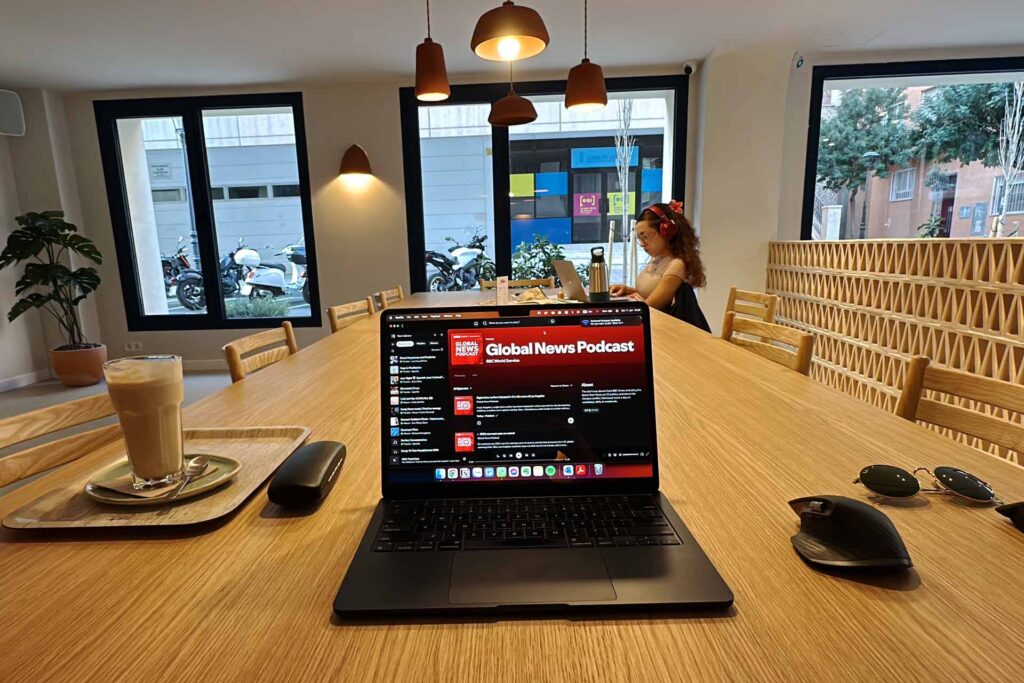
It’s been my weekend hideout—a spot where I can study, work, and not feel like I’m competing with the decibel level of an outdoor fiesta. The coffee? Pretty good. The ambience? Just right.
That said, even here, noise sneaks in. Occasionally, I still have to politely ask guests to be mindful of their “personal volume.” But at this point, I’ve accepted that silence is a luxury in Spain—and I’m learning to work with it.
The Staring Game: A Cultural Curiosity
One of the first things I noticed when I arrived in Spain? People stare. A lot.
At first, I kept wondering—Do I have something on my face? Did I dress weirdly today? But no, it was just unfiltered curiosity in its purest form.
At first, I felt a little uncomfortable. Then I decided to embrace it. Instead of awkwardly looking away, I started greeting people with a cheerful “Hola” or “Buenas” (hello in Spanish) or a friendly smile. The reactions? A mix. Some smiled back, some replied with a “hola,” and others? They just kept staring.
And then, one day, I decided to turn it into a game. If someone stared at me for long enough, I stared right back. Some looked away immediately, some held their ground, and a few committed to the challenge longer than I expected. Fine, you win.
Understanding the Staring Culture
Over time, what started as mild annoyance turned into pure amusement. Now, whenever I catch someone staring, I just say Hola before they even have the chance to process their own curiosity. Works every time.
The more I thought about it, the more I realised—this isn’t just a Spanish thing. Back home in Vietnam, expats experience the same thing. It’s not rudeness; it’s just how people express their curiosity. Some cultures are more discreet about it, while others? Well, not so much.
At Work: The Curiosity Continues
The curiosity didn’t stop on the streets—it followed me into the office. For the first three months of my traineeship, almost every week, someone would come up to me and ask where I was from. Not surprising, really. I suppose there aren’t many Asians at EUIPO, let alone a Vietnamese trainee, so people couldn’t help but be curious.
But here’s what I love—people here are animated, genuine, and open. Once the initial curiosity passes, conversations flow, and connections start forming. And honestly? I wouldn’t trade that for anything.
Falling for Barcelona: A City That Captivates the Senses (and a piece of my heart)
It took me far too long, but I finally made it to Barcelona—and it was everything I didn’t know I needed.
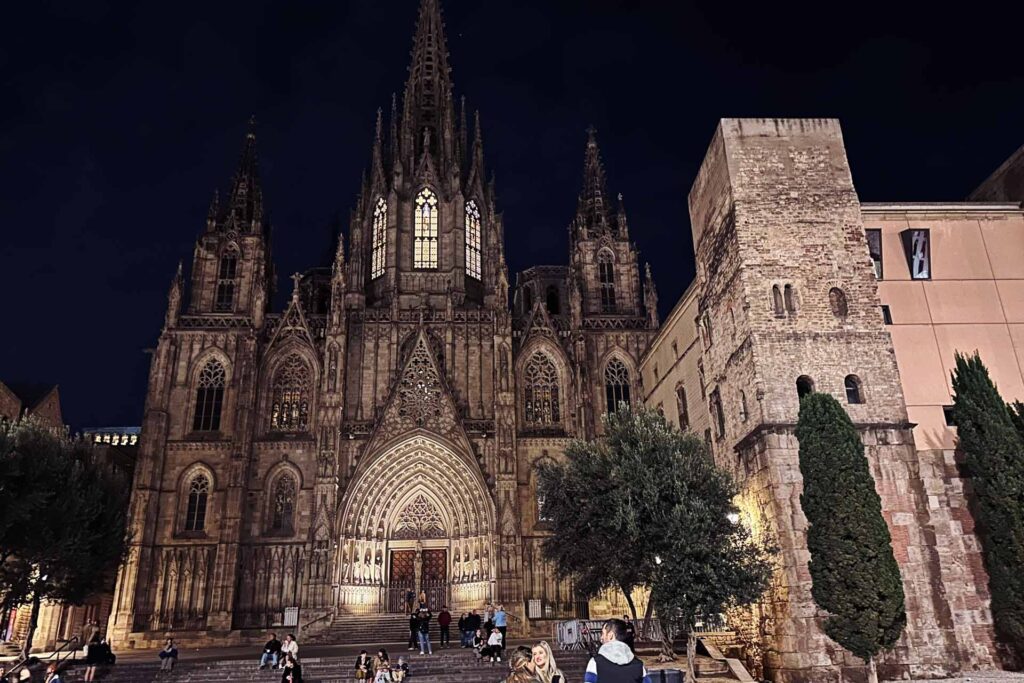
Even though I had visited Spain three times before moving here, for some reason, Barcelona had always excluded me. I’d been to Madrid, León, Segovia, Mallorca, Santiago de Compostela—yet this dynamic, buzzing city remained the one that got away. But now that I’ve experienced it? I completely understand the hype.
The funny thing is, when I first arrived, Barcelona didn’t exactly greet me with sunshine. The sky was grey, and the drizzle reminded me of London—a city that shaped a part of me. But as I explored, something clicked. To me, Barcelona feels like a fusion of London and Saigon, with the added bonus of the beach. It has London’s international energy, where ideas and cultures collide, mixed with the raw vibrancy and street life of Saigon. It’s structured yet chaotic, cosmopolitan yet deeply local, and somehow, that contrast makes it all the more captivating.
A City That Awakens Creativity
One of the things I love most about travel is how certain places ignite something deep within you. Barcelona did exactly that, awakening a part of myself I didn’t even know was dormant.
I’ve always thrived in environments where creativity and entrepreneurship collide, where ideas flow as naturally as conversation. And here? I was surrounded by it.
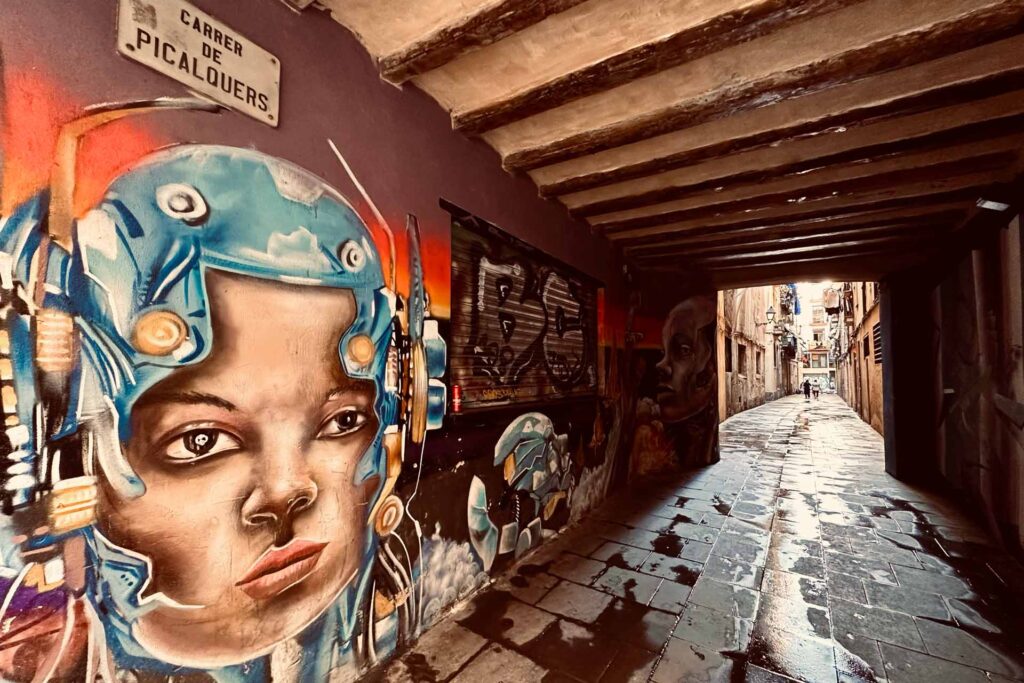
Even when I wasn’t actively seeking it out, inspiration found me. I stumbled upon a co-working “table” at a café—not a full workspace, just a designated long table where freelancers could sit and work. The catch? No laptops are allowed beyond this area.
At first, it seemed like an odd quirk, but in reality, it created the perfect space for meaningful interactions. Instead of being glued to screens, people actually talked—exchanging ideas, sharing recommendations, and making real connections.
Before I knew it, I had met someone new, and suddenly, I was seeing Barcelona through a local’s eyes.
The Magic of the Unexpected
That’s the kind of magic I crave—the unexpected moments, the serendipitous connections that spark something new within you. And Barcelona delivered that in spades. The energy, the creativity, the sense of possibility—it was all-consuming.

As I prepare to leave this chapter behind, I know one thing for certain: I will be back. Barcelona has captured a piece of my heart, and I can’t wait to see what other wonders it has in store for me.
Lessons from Friendships
The trainee community at EUIPO is incredibly diverse—people from all over Europe and beyond, each bringing their own backgrounds, experiences, and perspectives. What’s amazing is how fast we bonded—whether it was over shared challenges, cultural differences, or simply navigating life in Spain together.

One of the things I appreciate the most? The little everyday moments that turn colleagues into real friends.
We have lunch together almost every day, exchanging stories, laughter, and sometimes even debating the quirks of our home countries. What starts as casual conversations about weekend plans often turns into deep discussions about our dreams, ambitions, and where life might take us next.
These friendships have been one of the best parts of this journey. From spontaneous after-work hangouts to late-night reflections about career paths, personal growth, and the kind of lives we want to build, I’ve learned so much just from being surrounded by different perspectives.
But it’s not just the big conversations—it’s the simple joys, too. Celebrating birthdays together, hyping each other up before important presentations, and offering support when someone’s having a tough day. These are the moments that make this experience more than just a traineeship.
Beyond work, I’ve also been fortunate to build friendships outside of the office, learning from locals, exchanging insights with people from all walks of life, and simply experiencing Spain in a way that feels deeply personal.
Looking Ahead: A Journey That’s Only Beginning
As I reflect on the past six months, I realise just how much this experience in Spain has shaped me. What started as a leap into the unknown, once again turned into a journey of growth, resilience, and adaptation.
I’ve faced challenges—the language barrier, the slower pace of life, the cultural nuances that took time to understand. But instead of resisting them, I learned to embrace the differences, find the humour in the struggles, and appreciate the richness of a culture that is not my own.
At the same time, having time on my own has been just as valuable. It has given me space to reflect, observe, and better understand myself—how I integrate into a new culture, how I adapt to different environments, and how I grow through every interaction.
And beyond personal growth, this journey has reaffirmed something even more important:
Meaningful experiences are never just about the place but about the people, the conversations, and the connections that shape them.
This traineeship is about so much more than just work. It’s about stepping outside of what’s familiar, allowing myself to be shaped by new perspectives, and embracing the unknown with curiosity rather than fear. And with six months still ahead, I know this journey is far from over—there is still more to learn, explore, and become.
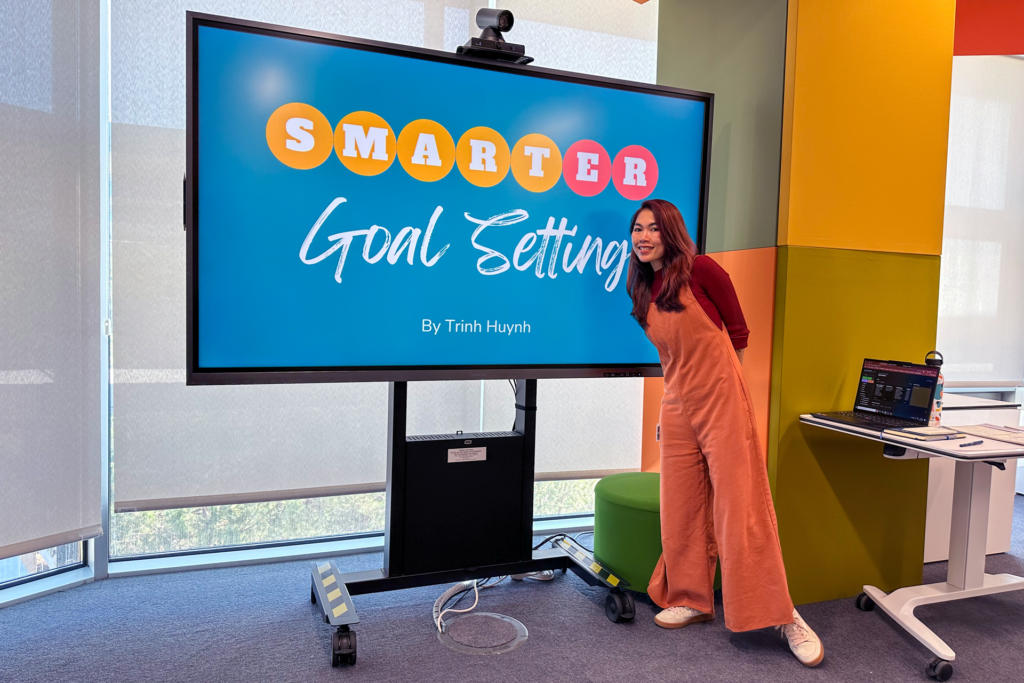
Where this experience will ultimately lead me? I don’t have the answer just yet. But maybe that’s the beauty of it—some chapters aren’t meant to be closed too soon. I’ll likely have another reflection after a few more months, as new experiences unfold and new lessons emerge.
For now, I’d love to hear from you—if you’ve ever lived abroad, what was the most surprising or transformative lesson you learned? Drop your thoughts in the comments!


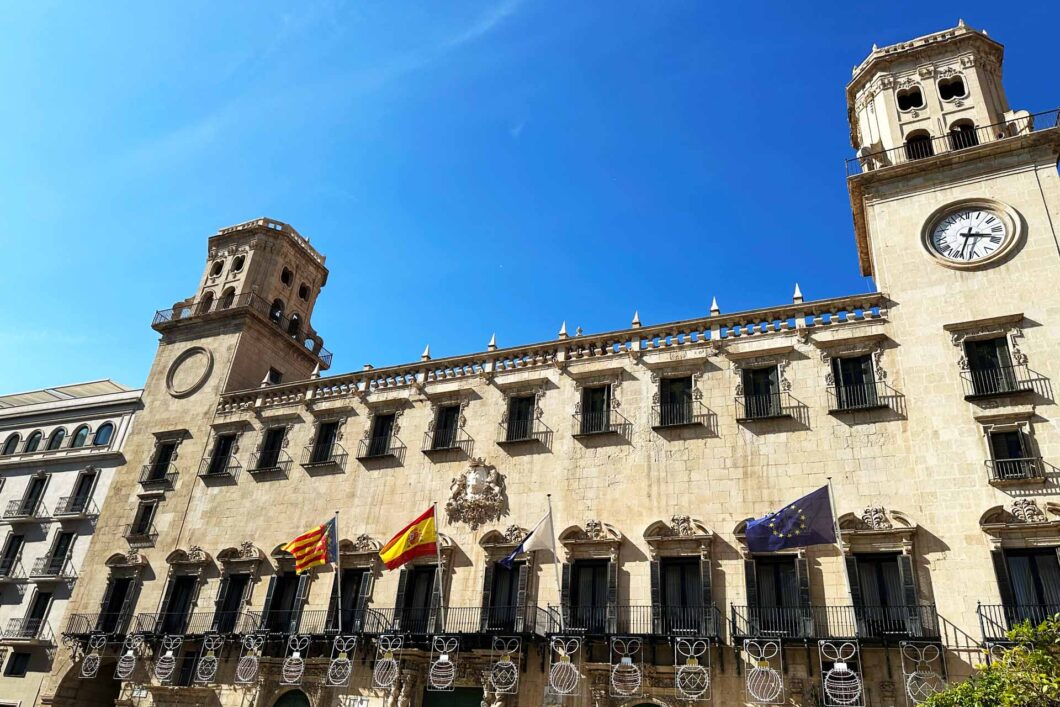
Love this! And hopefully many more lessons are to come. 😉